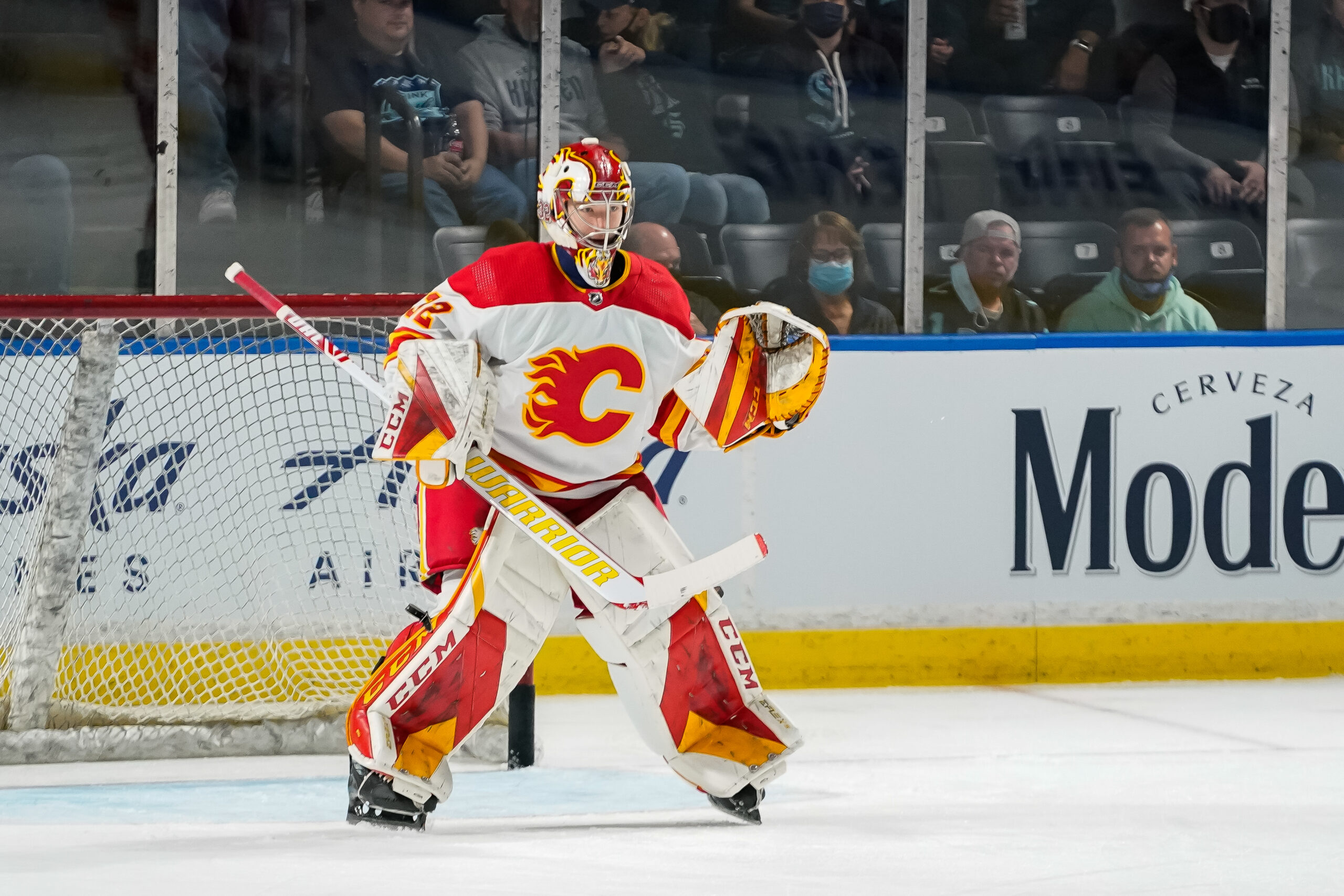
This past season was the first chance for Calgary Flames fans to watch Dustin Wolf in a prominent NHL role. I was shocked regarding the timing, since it felt like less of a premeditated decision to call the young goaltender up.
Rather, it felt like a manager having his hand pressed because of injuries to Jacob Markstrom and Dan Vladar. If not for those circumstances, it’s probable that we weren’t going to see Wolf in a continuous NHL role this season.
The former WHL Top Goaltender and AHL Best Goaltender (among many other titles) effectively received a month-long tryout, but Wolf was working behind a club that had just dealt Noah Hanifin and Chris Tanev, so I’d take his rookie stats with a grain of salt.
As for what’s ahead, Dustin Wolf is an RFA and in need of a new deal. With only 18 NHL games and less-than-stellar base statistics in those games, it looks like Wolf might be signed to a short-term, low-AAV bridge or “prove-it” deal. However, if I were Wolf’s camp, I’d be curious about the NHL job security for Wolf.
Upon studying some contract comparables and their NHL playing time, we can better comprehend what next year may hold for Wolf.
For background, Dustin Wolf is still ‘waiver-exempt’ next season, according to CapFriendly, with 62 games or 1 season remaining before he loses the exemption.
This implies that Wolf can be sent down to the AHL Wranglers next season at any moment without having to go through waivers, providing the NHL team less pressure to maintain him on the NHL roster as there is no chance of a waiver claim.
With Jacob Markstrom contracted for 2 more seasons at a $6 million salary cost, and Dan Vladar inked next season at a $2.2 million cap hit, the Calgary Flames have committed $8.2 million into their goalies next year, and none of that has gone to Wolf, the 23-year-old RFA.
Goalies of similar ages and expiring RFAs like Samuel Ersson, Lukas Dostal, Joel Hofer, and Nico Daws got greater opportunity in the NHL last season than Wolf, with differing statistical performances, but similar contract conditions.
Ersson got $1.45 million x 2 years but played 51 games with somewhat better figures than Wolf’s 17-game tenure.
Dostal played 44 games on Anaheim last season, on a team that was not competing for the playoffs, and put up similar stats to Wolf but was magnificent at the recent World Championship for gold-medal-winner Czechia (he is getting $812,500 next year on his post-ELC ‘bridge’ deal).
Hofer put up fantastic stats on St. Louis, one of the worst analytical teams this season, behind Jordan Binnington, and is making $775,000 next year on his post-ELC ‘bridge’ deal. Daws put up identical stats to Wolf, and is now an unsigned RFA, with one more season of NHL experience than Wolf (25 games in 2021-22).
Based on the prospective comparables above, Dustin Wolf is likely bound for a contract with a similar cap impact to his ELC (~$900,000). Wolf is also headed for another year of floating between the AHL and NHL unless a Flames netminder is transferred.
The asset who was previously one of the top prospects not playing in the NHL might not get a full-time NHL shot until his ‘age 24’ season in 2025-26, giving further reason for uncertainty in fans’ and critics’ eyes.
Wolf is still an intriguing prospect, but I can’t see an NHL road for the goaltender based on the current Flames team configuration (assuming no changes are made).
It’s likely that this circumstance may impair Wolf’s confidence, knowing that he’s still a ‘backup to an NHL backup’ during his third full professional hockey season, and he’s won several honors in the AHL during this time.
This does not seal the door for innovation about contract length, but most goalies in this scenario have little power or NHL success to secure lengthier or more lucrative contracts.
In two years’ time, I’m interested if Wolf will still be playing for the Flames given next year is his last waiver-exempt season.
The patience displayed in the Flames’ approach to Wolf’s development is starting to cause NHL regulations like waivers to take effect, and these types of measures are in place to give NHL opportunities to players who may be considered ‘gate-kept’.


Leave a Reply